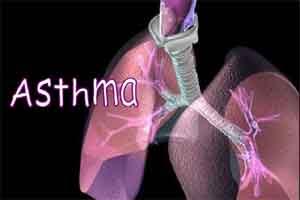- Home
- Editorial
- News
- Practice Guidelines
- Anesthesiology Guidelines
- Cancer Guidelines
- Cardiac Sciences Guidelines
- Critical Care Guidelines
- Dentistry Guidelines
- Dermatology Guidelines
- Diabetes and Endo Guidelines
- Diagnostics Guidelines
- ENT Guidelines
- Featured Practice Guidelines
- Gastroenterology Guidelines
- Geriatrics Guidelines
- Medicine Guidelines
- Nephrology Guidelines
- Neurosciences Guidelines
- Obs and Gynae Guidelines
- Ophthalmology Guidelines
- Orthopaedics Guidelines
- Paediatrics Guidelines
- Psychiatry Guidelines
- Pulmonology Guidelines
- Radiology Guidelines
- Surgery Guidelines
- Urology Guidelines
More than 40% women with asthma may develop COPD

A new study published in the Annals of the American Thoracic Society finds that more than 4 in 10 women with asthma may develop the chronic obstructive pulmonary disease (COPD).
Teresa To, Child Health Evaluative Sciences, The Hospital for Sick Children, Toronto, Canada, and colleagues conducted the study to quantify the risk of developing COPD in Ontario women with asthma and identify factors that are associated with increased risk.
Data for Ontario women with asthma who participated in the Canadian National Breast Screening Study from 1980─1985 were linked to health administrative databases and participants were followed from 1992─2015. The study involved the analysis of 4,051 women with asthma in Canada who were followed for about 14 years after being diagnosed with the condition.
The researchers examined risk factors for developing asthma and COPD overlap syndrome, known as ACOS. Those who develop ACOS experience increased exacerbations and hospitalizations and have a lower quality of life, compared to those who have asthma or COPD alone.
Also Read: Omalizumab effective in asthma COPD overlap patients also
Key Findings:
- Among 4,051 women, 1,701, or 42 percent, developed COPD.
- Low education, high body mass index, rurality, and high levels of cigarette smoking were associated with asthma and COPD overlap syndrome (ACOS).
- Exposure to fine particulate matter (PM2.5), a major air pollutant, was not associated with ACOS incidence.
- Women who had a more than five-pack-year smoking history, meaning they had smoked more than the equivalent of a pack of cigarettes a day for five years, were much more likely to develop ACOS than those who smoked fewer cigarettes or never smoked.
- However, ACOS did not affect only those who smoke: 38 percent of the women who developed ACOS in the study had never smoked.
"Previous studies have found an alarming rise in ACOS in women in recent years and that the mortality rate from ACOS was higher in women than men," said Dr. To. "We urgently need to identify and quantify risk factors associated with ACOS in women to improve their health and save lives."
In addition to smoking, the study identified obesity, rural residence, lower education levels and unemployment as significant risk factors for ACOS. The authors speculate that these factors indicative of low socioeconomic status may result in suboptimal access to care, under-treatment of asthma and poor compliance with medications, all of which lead to more frequent asthma attacks. These attacks, in turn, may lead to airway remodeling that increases the chances of developing ACOS.
The researchers noted that they lacked the data to investigate this association directly. Study limitations also include not having information about exposure to second-hand smoke and exposure to air pollution over the entire time the women were followed.
"Individual risk factors appear to play a more significant role in the development of ACOS in women than environmental factors, such as air pollution. Prevention strategies targeting health promotion and education may have the potential to reduce ACOS incidence in this population," concluded the authors.
For further information log on to https://doi.org/10.1513/AnnalsATS.201802-078OC

Disclaimer: This site is primarily intended for healthcare professionals. Any content/information on this website does not replace the advice of medical and/or health professionals and should not be construed as medical/diagnostic advice/endorsement or prescription. Use of this site is subject to our terms of use, privacy policy, advertisement policy. © 2020 Minerva Medical Treatment Pvt Ltd